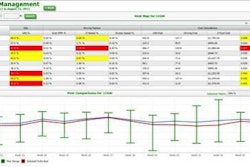On Tuesday, March 25, a fleet executive panel at the Truckload Carriers Association Annual Convention responded to the possibility of electronic logging devices (ELDs) being a Trojan horse to reform driver pay.
Plaintiff attorneys and state agencies want to use hours-of-service data collected from ELDs to make minimum wage calculations, said panelist Josh England, president and chief financial officer of C.R. England, the nation’s largest refrigerated carrier based in Salt Lake City, Utah.
“It’s not accurate to be used for that purpose,” he said, explaining that fleets do not control drivers or approve and disapprove of every hour they work. Mileage-based pay motivates drivers to maximize their driving hours in a compliant fashion. By contrast, hourly pay does not give drivers more available driving time and makes them less motivated to minimize their unproductive “on-duty, non-driving” hours.
“Those hours tend to be inflated and that becomes the basis for minimum wage calculations,” he said. “That’s why we have a production-based system.”
California’s minimum wage law adds another layer of complexity. Companies that use a piece-rate compensation formula have to pay their workers separately for rest periods. Attorneys also argue that mileage-based pay does not comply with the law to cover driver work activities like fueling and detention at shipping and receiving facilities.
“The industry argues that (paying drivers by the mile) is preemptive and full of interpretation,” England said. “When you think about the production impact of paying hourly rather than by the mile that’s a scary thought.”
Driver unions and the Owner-Operator Independent Drivers Association are also leading a charge to reform driver pay as reported by CCJ.










